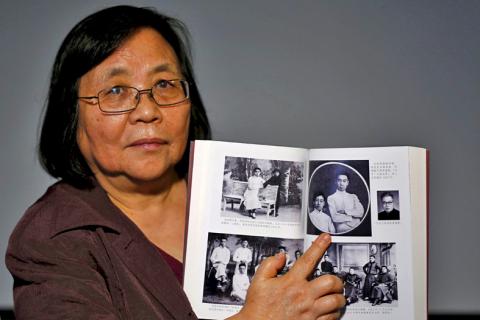The romance between Gu Hai (顧海) and Bai Luoyin (白洛因), two handsome gay senior high school students from the Web series Addiction (上癮), has caused a sensation in both China and Taiwan.
The program was seen by 10 million viewers on the day of its release in January, setting a new record for China’s television industry and was the most watched show on China’s leading video streaming sites. Netizens on both sides of the Taiwan Strait, it seemed, had become addicted to Addiction.
Then the Chinese government shut the series down.

Photo: Reuters
Early this month, Beijing issued new guidelines for television just a week after the popular gay-themed drama was pulled, banning them from including storylines involving homosexuality and other “vulgar, immoral and unhealthy” content that “exaggerates the dark side of society.”
The disappearance of the series late last month, which triggered an uproar on social media, displays “Chinese authorities’ distinct discomfort regarding homosexuality,” Time magazine reported. Such discomfort is also reflected in China’s handling of The Secret Emotional Life of Zhou Enlai (周恩來的秘密情感世界), a new book about the late Chinese premier Zhou Enlai (周恩來).
WAS ZHOU ENLAI GAY?

Photo courtesy of men’s uno Taiwan
When the Chinese Communist Party (CCP) defeated the Chinese Nationalist Party (KMT) in 1949, Zhou became the first premier of the People’s Republic of China, holding the post until his death in 1976. Charming, gentle and sophisticated in public, he presented a modern face as the country’s second most powerful man, serving as a role model for a “new China.”
But a new book, Secret, says that he may have been gay.
“Zhou Enlai was a tragic figure. He was very famous and always under the media spotlight,” the book’s author Tsoi Wing-mui (蔡詠梅) told BBC News. “But there were many aspects of his life that were like riddles and difficult to explain.”
Tsoi’s hypothesis is based on Zhou’s diary entries and personal letters, alleging that he harbored a lifelong love for a schoolmate, and that his sexual orientation would perfectly explain some “mysteries” about his life.
Tsoi said these mysteries include Zhou’s coldness toward his wife Deng Yingchao (鄧穎超), a former chairwoman of the Chinese People’s Political Consultative Conference, in a “marriage of convenience” that benefited their political purposes.
It also helps to explain his absolute obedience to Mao Zedong (毛澤東), who may have threatened to reveal his secret. After all, Tsoi stressed, homosexuality was seen as a sin against socialism because the communists, somewhat oddly, labeled it “a capitalist way of life.”
Unsurprisingly, Tsoi’s book has been banned in China. Hong Kong entertainer Wong He (王喜) was even cut from a CCTV variety show after he shared on Facebook an article about the book.
The bans on the popular drama and new book make it clear that China has yet to accept homosexuality. Indeed, the Chinese government did not decriminalize gay sex until 1997, and homosexuality was classified until 2001 as a “psychiatric disorder.” The world’s largest country by population has no openly gay politician because that would be political suicide.
LGBT CENSORSHIP
Beijing likes to show its strength through authoritarian gestures, but censorship on homosexuality, like many other human rights issues, merely shows its fear and causes considerable anger among its population.
Shanghai Pride (上海驕傲節) spokesman Matthew Baren recently said that while it is “disappointing” that Addiction has disappeared, “it’s very encouraging to see shows about homosexuality being made in China, by Chinese talent and for Chinese audiences.”
Though it was reported last week that a gay-themed variety show has been rejected by several TV stations due to the sensitivity of the issues it would tackle, Taiwan is considered relatively friendly to the LGBT community and can play a progressive role. By offering greater protection of LGBT rights, it can distinguish itself by upholding the universal value of human rights and set a good example for less progressive societies.

The Taipei Times last week reported that the rising share of seniors in the population is reshaping the nation’s housing markets. According to data from the Ministry of the Interior, about 850,000 residences were occupied by elderly people in the first quarter, including 655,000 that housed only one resident. H&B Realty chief researcher Jessica Hsu (徐佳馨), quoted in the article, said that there is rising demand for elderly-friendly housing, including units with elevators, barrier-free layouts and proximity to healthcare services. Hsu and others cited in the article highlighted the changing family residential dynamics, as children no longer live with parents,

Oct 20 to Oct 26 After a day of fighting, the Japanese Army’s Second Division was resting when a curious delegation of two Scotsmen and 19 Taiwanese approached their camp. It was Oct. 20, 1895, and the troops had reached Taiye Village (太爺庄) in today’s Hunei District (湖內), Kaohsiung, just 10km away from their final target of Tainan. Led by Presbyterian missionaries Thomas Barclay and Duncan Ferguson, the group informed the Japanese that resistance leader Liu Yung-fu (劉永福) had fled to China the previous night, leaving his Black Flag Army fighters behind and the city in chaos. On behalf of the

I was 10 when I read an article in the local paper about the Air Guitar World Championships, which take place every year in my home town of Oulu, Finland. My parents had helped out at the very first contest back in 1996 — my mum gave out fliers, my dad sorted the music. Since then, national championships have been held all across the world, with the winners assembling in Oulu every summer. At the time, I asked my parents if I could compete. At first they were hesitant; the event was in a bar, and there would be a lot

The election of Cheng Li-wun (鄭麗文) as chair of the Chinese Nationalist Party (KMT) marked a triumphant return of pride in the “Chinese” in the party name. Cheng wants Taiwanese to be proud to call themselves Chinese again. The unambiguous winner was a return to the KMT ideology that formed in the early 2000s under then chairman Lien Chan (連戰) and president Ma Ying-jeou (馬英九) put into practice as far as he could, until ultimately thwarted by hundreds of thousands of protestors thronging the streets in what became known as the Sunflower movement in 2014. Cheng is an unambiguous Chinese ethnonationalist,